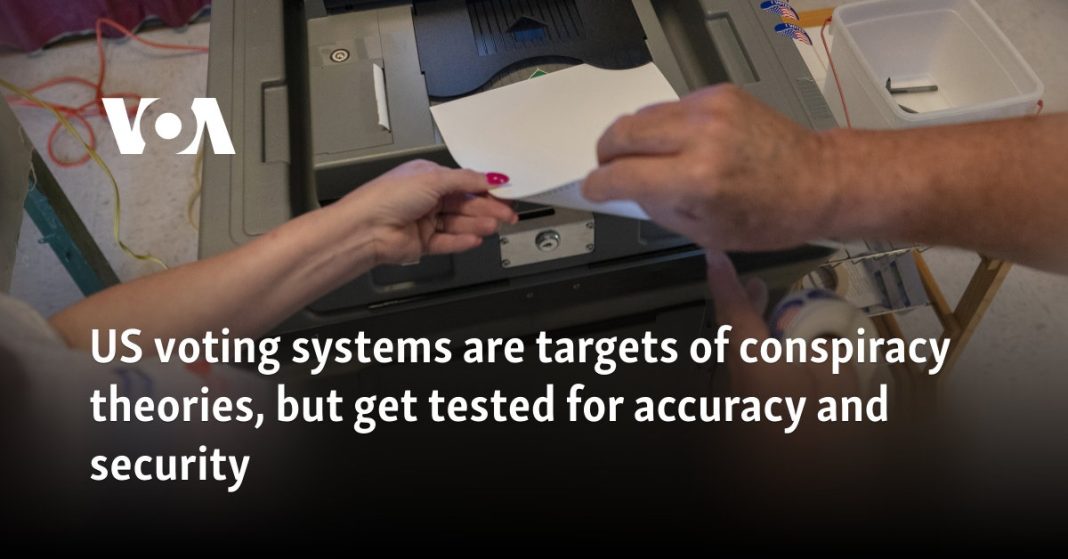ATLANTA — The Truth About Voting Machines: Debunking Myths and Ensuring Security Ahead of the 2024 Election
As the 2024 presidential election approaches, voting machines are once again in the spotlight, surrounded by a swirl of conspiracy theories and misinformation. Following the contentious 2020 election, where former President Donald Trump and his allies claimed that voting machines were manipulated to steal the presidency, many voters are left wondering: how secure are our voting systems? Let’s break down the facts, dispel the myths, and explore the measures in place to ensure fair and accurate elections.
The Background: A Web of Conspiracy Theories
Since Joe Biden’s victory in 2020, the narrative surrounding voting machines has been fraught with unfounded claims of widespread fraud. Despite numerous audits and reviews in key battleground states confirming the election results, the skepticism persists. In a significant legal development, Fox News recently agreed to pay Dominion Voting Systems $787 million to settle a defamation lawsuit, highlighting the impact of misinformation on public trust in the electoral process.
Understanding Voting Machines: What Are They?
Voting machines are just one piece of a complex puzzle that makes up our election system. Election officials use various technologies, including voter registration databases, election management systems, and electronic pollbooks, to ensure a smooth voting process. While each jurisdiction may have its own methods, the goal remains the same: to conduct fair and accurate elections.
Most voters fill out their ballots by hand, which are then scanned and counted electronically. In some areas, voters can mark their choices on a computer, receiving a printed summary that is inserted into a scanner. This blend of technology and traditional methods aims to enhance accuracy while providing a paper trail for verification.
The Internet Connection: Are Voting Machines Online?
One common misconception is that voting machines are connected to the internet, making them vulnerable to hacking. The reality is that, with few exceptions, most voting machines operate offline. Some jurisdictions may use private networks to transmit unofficial results after polls close, but these systems are designed to minimize risks. Election officials emphasize that paper records are crucial for authenticating results during post-election reviews and recounts.
Security Measures: How Safe Are Our Voting Machines?
In response to past threats, including attempts by foreign actors to probe voter registration systems, election officials have ramped up security measures. The U.S. Cybersecurity and Infrastructure Security Agency has classified election systems as critical infrastructure, allowing for enhanced cybersecurity support across the nation.
Physical security is paramount, with locked rooms, limited access, and tamper-evident seals protecting voting equipment. Before elections, officials conduct rigorous testing to ensure machines are counting votes accurately. Post-election audits further verify the integrity of the results, with around 98% of ballots in the upcoming election featuring a paper record.
The Call for Improvement: Experts Weigh In
While election officials are confident in the security of voting systems, some experts argue for further enhancements. Concerns have been raised about the use of certain technologies, particularly machines that mark ballots for voters. A long-standing legal battle in Georgia seeks to replace these machines with hand-marked paper ballots, reflecting a broader push for transparency and security.
Moreover, security breaches following the 2020 election, where Trump allies attempted to access voting systems, have raised alarms. Experts are calling for federal investigations into these incidents, emphasizing the need for robust protections against potential threats.
Ensuring Accuracy: The Safeguards in Place
To ensure the accuracy of elections, officials implement a variety of safeguards. From physical security measures to pre-election testing and post-election reviews, the integrity of the voting process is a top priority. With nearly all ballots featuring a paper record, officials can confidently address any discrepancies or cyber threats that may arise.
Conclusion: A Secure Path Forward
As we gear up for the 2024 election, it’s essential to separate fact from fiction regarding voting machines. While conspiracy theories may continue to circulate, election officials are committed to maintaining the security and integrity of our electoral process. With layers of protection in place and a focus on transparency, voters can feel confident that their voices will be heard, and their votes will count. So, as you prepare to cast your ballot, remember: the truth about voting machines is rooted in security, accuracy, and a commitment to democracy.



